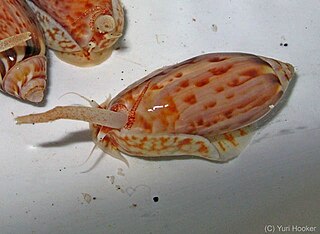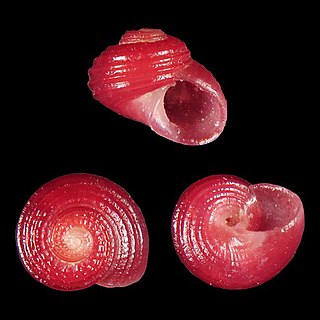Description
The shell reaches a height of 3 mm.
This section needs expansion. You can help by adding to it.(February 2013) |
| Collonista amakusaensis | |
|---|---|
| Scientific classification | |
| Kingdom: | |
| Phylum: | |
| Class: | |
| (unranked): | clade Vetigastropoda |
| Superfamily: | |
| Family: | |
| Genus: | |
| Species: | C. amakusaensis |
| Binomial name | |
| Collonista amakusaensis Habe, 1960 | |
Collonista amakusaensis is a species of sea snail, a marine gastropod mollusk in the family Colloniidae. [1]
The shell reaches a height of 3 mm.
This section needs expansion. You can help by adding to it.(February 2013) |
This marine species occurs off Japan.

A seashell or sea shell, also known simply as a shell, is a hard, protective outer layer created by an animal that lives in the sea. The shell is part of the body of the animal. Empty seashells are often found washed up on beaches by beachcombers. The shells are empty because the animal has died and the soft parts have been eaten by another animal or have decomposed.

The gastropods, commonly known as snails and slugs, belong to a large taxonomic class of invertebrates within the phylum Mollusca called Gastropoda. This class comprises snails and slugs from saltwater, from freshwater, and from the land. There are many thousands of species of sea snails and slugs, as well as freshwater snails, freshwater limpets, and land snails and slugs.

Sea slug is a common name for some marine invertebrates with varying levels of resemblance to terrestrial slugs. Most creatures known as sea slugs are actually gastropods, i.e. they are sea snails that over evolutionary time have either completely lost their shells, or have seemingly lost their shells due to having a greatly reduced or internal shell. The name "sea slug" is most often applied to nudibranchs, as well as to a paraphyletic set of other marine gastropods without obvious shells.

Heterobranchia, the heterobranchs, is a taxonomic clade of snails and slugs, which includes marine, aquatic and terrestrial gastropod mollusks.

The operculum, meaning little lid, is a corneous or calcareous anatomical structure like a trapdoor which exists in many groups of sea snails and freshwater snails, and also in a few groups of land snails; the structure is found in some marine and freshwater gastropods, and in a minority of terrestrial gastropods, including the families Helicinidae, Cyclophoridae, Aciculidae, Maizaniidae, Pomatiidae, etc.

Sea snail is a common name for slow moving marine gastropod molluscs usually with visible external shells, such as whelk or abalone. They share the taxonomic class Gastropoda with slugs, which are distinguished from snails primarily by the absence of a visible shell.

A micromollusk is a shelled mollusk which is extremely small, even at full adult size. The word is usually, but not exclusively, applied to marine mollusks, although in addition, numerous species of land snails and freshwater mollusks also reach adult size at very small dimensions.

Vetigastropoda is a major taxonomic group of sea snails, marine gastropod mollusks that form a very ancient lineage. Taxonomically the Vetigastropoda are sometimes treated as an order, although they are treated as an unranked clade in Bouchet and Rocroi, 2005.

Vanikoroidea is a superfamily of sea snails, marine gastropod molluscs in the clade Littorinimorpha. The superfamily Eulimoidea is a synonym of Vanikoroidea.

Olivoidea is a taxonomic superfamily of minute to medium-large predatory sea snails, marine gastropod mollusks in the clade Neogastropoda.

Freshwater snails are gastropod mollusks which live in fresh water. There are many different families. They are found throughout the world in various habitats, ranging from ephemeral pools to the largest lakes, and from small seeps and springs to major rivers. The great majority of freshwater gastropods have a shell, with very few exceptions. Some groups of snails that live in freshwater respire using gills, whereas other groups need to reach the surface to breathe air. In addition, some are amphibious and have both gills and a lung. Most feed on algae, but many are detritivores and some are filter feeders.
Pyropelta yamato is a species of small sea snail, a deep-water limpet, a marine gastropod mollusks in the family Pyropeltidae.

Colloniidae is a family of small sea snails with calcareous opercula, marine gastropod mollusks in the clade Vetigastropoda.
Collonista costulosa is a species of sea snail, a marine gastropod mollusk in the family Colloniidae.
Collonista is a genus of sea snails, marine gastropod mollusks in the family Colloniidae.

Collonista arsinoensis is a species of sea snail, a marine gastropod mollusk in the family Colloniidae

Laetifautor is a genus of sea snails, marine gastropod mollusks in the family Calliostomatidae.

Pusia is a genus of sea snails, marine gastropod mollusks in the family Costellariidae.

Collonista thachi is a species of sea snail, a marine gastropod mollusk in the family Colloniidae.

Collonista kreipli is a species of sea snail, a marine gastropod mollusk in the family Colloniidae.
| This Colloniidae-related article is a stub. You can help Wikipedia by expanding it. |